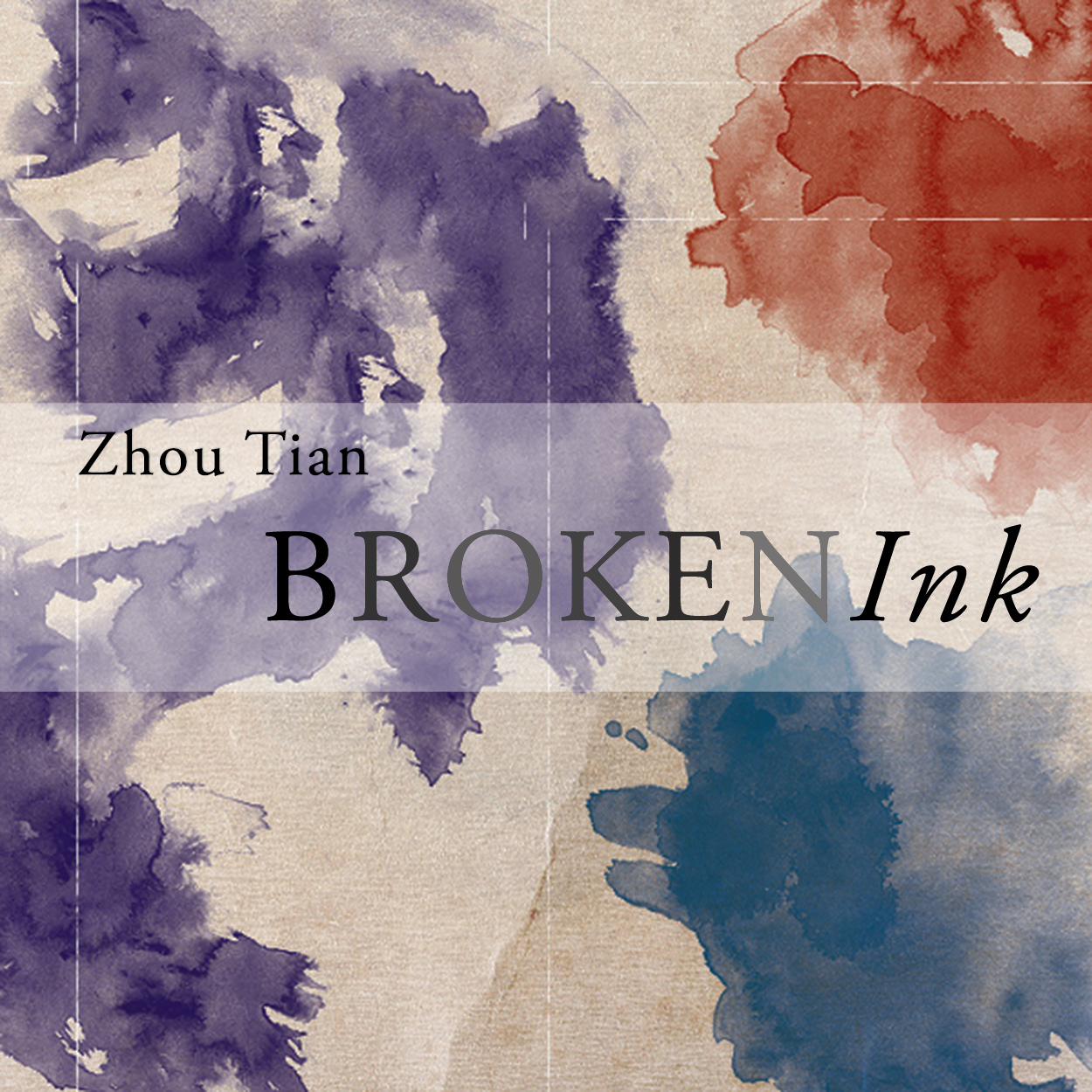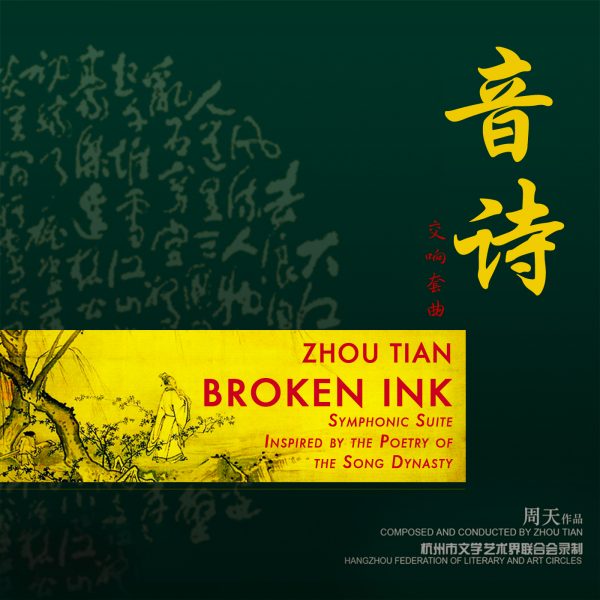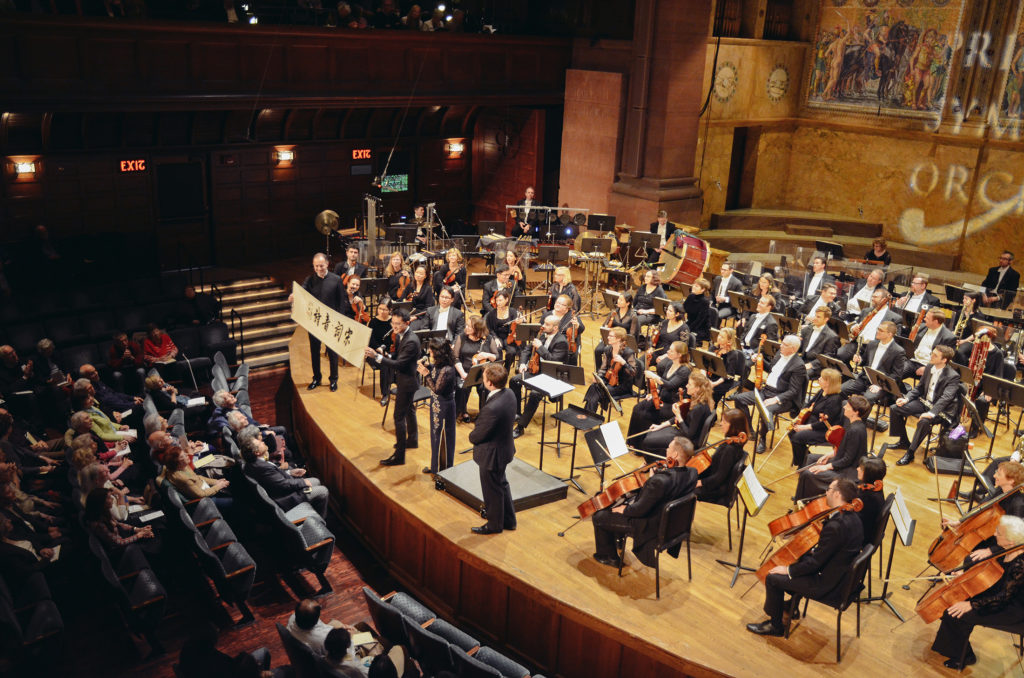
Broken Ink
(2013) | 32 minutes
Orchestral suite – movements may be performed separately
Commissioned by the city of Hangzhou, in partnership with China Federation of Literary and Art Circles and Princeton Symphony Orchestra
SCORING 3(picc) . 3(corA) . 3(Eb.Cl) . 3(cbn) / 4331 / timp / 4 perc: vibraphone, marimba, tuned gong set, glockenspiel, tubular bells, crotale, Tibetan singing bowls, tom-toms, snare drum, bass drum, triangle, mark tree, suspended cymbal, crash cymbal, Chinese cymbal, finger cymbals, traditional Chinese bass drum or Taiko drum, tam-tam, temple block / hp / pno(cel.) / str
PREMIERE 7 May 2017, Richardson Auditorium, Princeton, NJ. Princeton Symphony Orchestra
Rossen Milanov, conductor
RECORDING Guangzhou Symphony conducted by Zhou Tian (Pacific PCD6453)
Listen
V. Listening to the Land (exp.)
II. Watching the Tidal Bore
III. The Drizzling Rain at the Plum Season
Watch
Timestamps:
00:00 I. Hearing the Sound of the Rain and the Bell
08:30 II. Watching the Tidal Bore
13:30 III. The Drizzling Rain at the Plum Season
19:22 IV. The Mighty River Runs Eastward
25:08 V. Listening to the Land
Movements may be performed separately
Programme Note
The poetry and calligraphy of the Song Dynasty (960–1279) has long been a staple in the Chinese culture. And so when Hangzhou, once the capital of Southern Song – and my hometown – asked for a new piece celebrating the city’s magnificent cultural heritage, I was beyond excited. It was like a musical homecoming.
In “Broken Ink,” a symphonic suite inspired by the poetry of the Song dynasty, I sought to capture the poetic flavor that was lost in translation. The work was built as a mosaic of Chinese musical traditions and my approaches to writing for the symphony orchestra. In addition to the standard orchestral palette, the instrumentation also includes non-classical instruments such as Tibetan singing bowls, tuned gongs, and a large Chinese bass drum.
The work contains five parts, each inspired by a particular poem as follows, with brief descriptions:
I. HEARING THE SOUND OF THE RAIN AND BELL
Two lovers parting in the rain, drinking quietly in front of an old pavilion and a magnificent river while the sound of bell lingers. Inspired by “Bells Ringing in the Rain” by Liu Yong (987–1053).
II. WATCHING THE TIDAL BORE
Watching the splendid tidal bore of the Qiantang River, a drunken man hears the sound of flute and drums. Inspired by “Watching the Tidal Bore” by Liu Yong.
III. THE DRIZZLING RAIN AT THE PLUM SEASON
Seeking love in a town full of fluffy catkins from blooming willows. Inspired by “Green Jade Cup” by He Zhu (1052–1125).
IV. THE MIGHTY RIVER RUNS EASTWARD
Recalling the Battle of Red Cliff of the Three Kingdoms while boat riding on the Yangtze River. Inspired by “First Ode on the Red Cliff” by Su Shi (1036–1101).
V. LISTENING TO THE LAND
Remembering heroes when the end of a dynasty is near. Inspired by “Forever in Happiness (Reminiscing the bygone days)” by Xin Qiji (1140 –1207).
“Broken Ink” was commissioned by the city of Hangzhou, in partnership with China Federation of Literary and Art Circles and the Princeton Symphony Orchestra. The score calls for piccolo, 2 flutes, 2 oboes, English horn, clarinet in E-flat, 2 clarinets, 2 bassoons, contrabassoon, 4 horns, 3 trumpets, 3 trombones, tuba, timpani, percussion (4 players: vibraphone, marimba, tuned gong set, glockenspiel, tubular bells, crotale, tibetan singing bowls, tom-toms, snare drum, bass drum, triangle, mark tree, suspended cymbal, crash cymbal, Chinese cymbal, finger cymbals, traditional Chinese bass drum, tamtam, temple block), harp, piano (doubling celesta), and strings.
©Zhou Tian
“Broken Ink” won The Washington Metropolitan Philharmonic Ulysses S. James Composition Competition (2017-18)
關於樂曲,作曲家周天這樣寫道:“在創作它之前,一直覺得宋詞是一個龐大艱深、滿載著歷史的題材。我反复琢磨,看得越多,就越覺得自己身上的包袱沉重,久久不能寫下那第一個音。放下一切,重新仔細閱讀後,才發現,其實那些絢麗文字的背後,所透露的往往是詩人極其個人的人生經歷及內心感受。他們講述的都是人的情感,中國人的故事。我不打算用交響樂來詮釋宋詞,我希望做的是用音樂來表達如原文般或悲或喜的絢爛意境。宋詞的文字在七百年前就畫上了句號,但她的情思意蘊傳到了今天,也將永遠地流傳下去。這幾段音樂,就是創作於宋詞的情思意蘊中。詩意是永恆的,音樂也是永恆的。於是,我決定將第一個音休止,將這第一個音留給那些已故的詩人和他們的故事。在那無聲的第一拍之後,讓我們在宋詞的餘韻中聆聽《音詩》。”
Reviews
“Before venturing into the world of the early 20th century, the Princeton Symphony Orchestra continued its commitment to contemporary music with a United States premiere of Chinese composer Zhou Tian’s five-movement Broken Ink. A native of Hangzhou, China (whose Federation of Literary and Art Circles and city government commissioned Broken Ink), Tian was educated at leading musical institutions in the United States, and has achieved a remarkable career as a composer in a short amount of time. Broken Ink was inspired by the poetry of the 10th to 13th-century Song dynasty, and its five movements were descriptively titled to achieve Tian’s goal of bringing Chinese musical flavor to an orchestral piece.
Broken Ink began with high violins and flute, punctuated with single notes from harpist André Tarantiles. The music was lush, much like a flowing river, and it was clear from the outset that Tian has a good ear for the orchestral palette. Throughout the piece, there were numerous instances of raindrop effects, often from the harp, which were contrasted by melodic solos from clarinetist Pascal Archer, English hornist Mitchell Kuhn, oboist Nathan Mills, and violinist Basia Danilow. The quartet of horns were consistently clean, and the cello section often had expansive melodies of their own which were well played. The five-member percussion section was kept busy in the two movements which were more forceful (depicting powerful rivers and tidal waves), and the sharp and jagged chords and accents from the orchestra were always together. Principal cellist Alistair MacRae’s graceful solo aided the orchestra in bringing the work to a close in an instrumental sunrise.”
—Princeton Town Topics
Recording
Apple Music | Amazon | Spotify
Guangzhou Symphony conducted by Zhou Tian (Pacific PCD6453)

